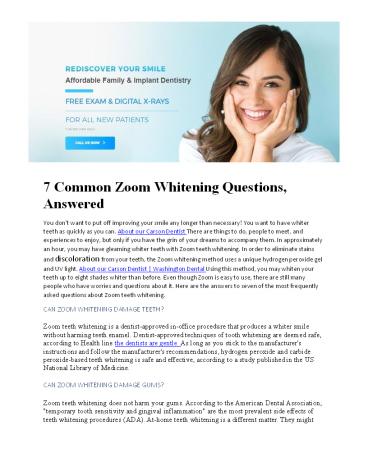Washington Dental - PowerPoint PPT Presentation
Title:
Washington Dental
Description:
7 Common Zoom Whitening Questions, Answered You don't want to put off improving your smile any longer than necessary! You want to have whiter teeth as quickly as you can. About our Carson Dentist There are things to do, people to meet, and experiences to enjoy, but only if you have the grin of your dreams to accompany them. In approximately an hour, you may have gleaming whiter teeth with Zoom teeth whitening. In order to eliminate stains and discoloration from your teeth, the Zoom whitening method uses a unique hydrogen peroxide gel and UV light. About our Carson Dentist | Washington Dental Using this method, you may whiten your teeth up to eight shades whiter than before. Even though Zoom is easy to use, there are still many people who have worries and questions about it. Here are the answers to seven of the most frequently asked questions about Zoom teeth whitening. – PowerPoint PPT presentation
Number of Views:3
Title: Washington Dental
1
7 Common Zoom Whitening Questions, Answered
You don't want to put off improving your smile
any longer than necessary! You want to have
whiter teeth as quickly as you can. About our
Carson Dentist There are things to do, people to
meet, and experiences to enjoy, but only if you
have the grin of your dreams to accompany them.
In approximately an hour, you may have gleaming
whiter teeth with Zoom teeth whitening. In order
to eliminate stains and discoloration from your
teeth, the Zoom whitening method uses a unique
hydrogen peroxide gel and UV light. About our
Carson Dentist Washington Dental Using this
method, you may whiten your teeth up to eight
shades whiter than before. Even though Zoom is
easy to use, there are still many people who
have worries and questions about it. Here are the
answers to seven of the most frequently asked
questions about Zoom teeth whitening. CAN ZOOM
WHITENING DAMAGE TEETH? Zoom teeth whitening is
a dentist-approved in-office procedure that
produces a whiter smile without harming teeth
enamel. Dentist-approved techniques of tooth
whitening are deemed safe, according to Health
line the dentists are gentle. As long as you
stick to the manufacturer's instructions and
follow the manufacturer's recommendations,
hydrogen peroxide and carbide peroxide-based
teeth whitening is safe and effective, according
to a study published in the US National Library
of Medicine. CAN ZOOM WHITENING DAMAGE
GUMS? Zoom teeth whitening does not harm your
gums. According to the American Dental
Association, "temporary tooth sensitivity and
gingival inflammation" are the most prevalent
side effects of teeth whitening procedures
(ADA). At-home teeth whitening is a different
matter. They might
2
irritate or burn your gums if they aren't done
correctly. Before performing a teeth whitening
procedure on your own, make an appointment with
your dentist. CAN ZOOM WHITENING CAUSE
CANCER? No. The use of Zoom whitening products
has not been linked to an increased risk of
cancer. There is no increased risk of oral
cancer for persons who use tooth whitening
products (TWP) with hydrogen peroxide (Zoom
includes hydrogen peroxide) or carbide peroxide.
Teeth whitening solutions have also been found
to not raise the incidence of oral cancer, even
among heavy cigarette and alcohol users. The
research indicates that teeth whitening
treatments are safe for use by everyone, "even
potential unintentional usage by
youngsters." CAN ZOOM WHITENING WORK ON
CROWNS? No. None of Zoom's whitening options
work on dental crowns, implants, and veneers. For
the most part, tooth-colored fillings and crowns
won't whiten, according to the ADA. Why doesnt
Zoom work on cosmetic teeth? It's all about
Zoom's science. A chemical reaction occurs when
Zoom whitening hydrogen peroxide comes into
contact with your teeth. To remove the stain,
peroxide breaks down the bonds that hold the
stain in your enamel. There is a difference
between enamel and porcelain in crowns. Dental
veneers are made of porcelain that is custom-made
to match the color of your teeth. In contrast to
natural teeth, which are made of porous
materials, porcelain is impermeable, which means
that it does not absorb or attract staining like
a tooth. When a crown is first put in place, it
should never become discolored or require
whitening. HOW OFTEN CAN ZOOM WHITENING BE
DONE? Zoom whitening procedures are not
suggested more than once a year. You may be able
to undergo touch-up Zoom treatments every six
months, depending on your health and teeth. CAN
YOU GET ZOOM WHITENING WITH CAVITIES? Let's
speak about cavities if you're worried about
them. Priority is given to oral health over
aesthetics at all times. Whitening procedures do
not work effectively on teeth with cavities,
fractures, or deterioration. Especially on the
front teeth, minor fractures or cavities can be
whitened first before being repaired, allowing
the filling to be picked to fit the whiter smile
better. Crowns or veneers may be a preferable
option if you have extensive tooth decay or
damage. CAN YOU GET ZOOM WHITENING WHEN
PREGNANT? Even expectant mothers desire a
brighter smile. Even yet, Colgate advises
pregnant women not to undertake tooth whitening
treatments. Dental associations and the American
Pregnancy Association have come to a same
conclusion. Teeth whitening and other elective
aesthetic
3
procedures should be postponed until after birth,
despite the negligible danger to the fetus. You
should still undergo professional dental
cleanings while pregnant, since they may remove
plaque and tartar from the surface of your teeth
and give you a brighter smile.































